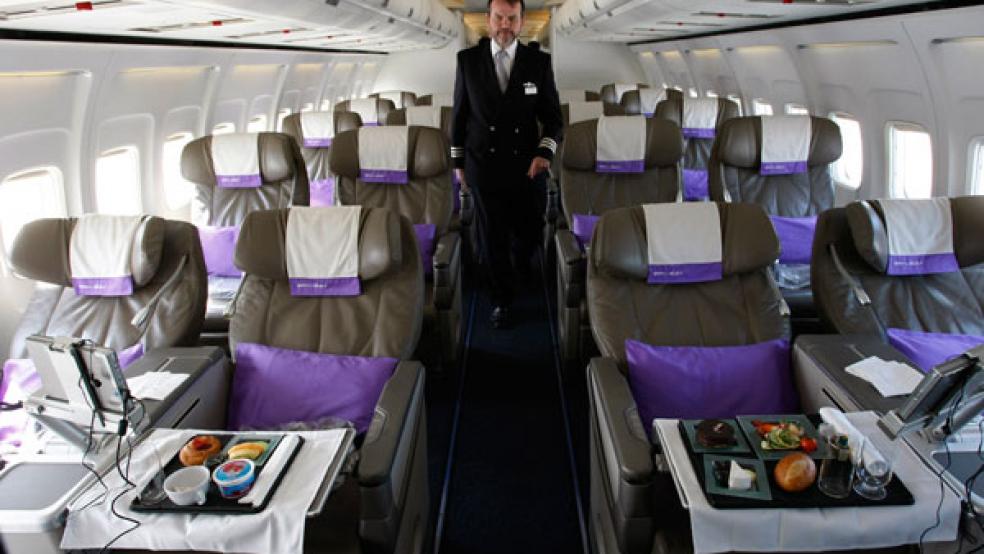It's 2039, and a major merger in the global corporate world is on the verge of being closed. The head of a Fortune 500 company is ready to seal the deal, but he needs to be in Beijing as quickly as possible.
In the past, going from New York City to Beijing would take the better part of a day; but by 2039, flying halfway around the world has changed. Now, thanks to planes flying faster at just short of supersonic levels, what was once a 13-hour journey has become a seven-hour flight. Henry Harteveldt, travel industry analyst at Atmosphere Research Group, envisions this possibility in 25 years.
Related: The Secret to Saving 30 Percent on Your Next Flight
"This would obviously be very expensive and intended for the folks whom time is money," Harteveldt said. "But in 25 years this may become more economically viable."
Welcome to the future of flying, or at least one vision of what it could be like in 2039.
Harteveldt said the flight experience over the next 25 years will improve not only for the folks with deep pockets, but also for those who simply want a more enjoyable flight. Although these advances won't eliminate all the hassles of flying—particularly as Airbus estimates 6.7 billion people will be flying worldwide by 2032, meaning more planes, more congestion and likely greater delays—below are a few of the changes experts expect to see in 25 years.
À La Carte Pricing
By 2039, Harteveldt predicts technology will enable airlines to adjust service in the sky to the needs of individual passengers. For example, people sitting in coach will be able to pay extra to receive a meal or drink service similar to what they would receive in business class—what he calls the "curtainless cabin."
"I think we will see ... the end of traditional first class, coach and so on," he said. "You buy the seat you want and you buy the amenities you want and you craft your own experience."
Seats for the Highest Bidder
Bidding for open seats is likely to become a routine part of flying in 25 years, Harteveldt said. A number of airlines are already looking at open-seat bidding, and a few carriers, including Virgin Atlantic and American, have hosted online seat upgrade auctions. But in the future, it will be done by the flight crew before the plane takes off.
Here's how it will work: If the airline has not sold all of the seats in premium-economy class or business class, the flight attendant will ask passengers to submit bids for the seat using their smartphones. Within minutes, the highest bidder will move to a better seat.
Staying Connected
The rapid development of planes offering Wi-Fi is just a taste of what's to come. By 2039, experts said the level of in-flight connectivity will grow to the point where sending email and surfing the Web from 35,000 feet will become easier and more reliable.
Related: Trade Short-Haul Air for High Speed Rail and Help the Climate
Whether or not airlines allow cellphone calls by passengers in-flight is hard to predict. The technology is already in place and will no doubt improve by 2039, but experts said the issue will likely be as it is today: passengers will not want to be bothered by others blabbering on a call throughout a flight.
Going Private
Alex Wilcox, CEO of private jet company JetSuite, said more Americans will be flying private 25 years from now. In particular, these private flights will connect wealthy individuals flying between smaller cities and remote destinations. JetSuite, for example, often flies between Jackson Hole, Wyoming, and San Francisco, and between Odessa, Texas, and small cities in North Dakota, where the oil boom brings executives from energy companies.
"People are leaving the airlines in droves because it is so much easier to drive," Wilcox said.
Subscription Air
Surf Air CEO Jeff Potter, whose airline allows its 900-plus members to fly as often as they'd like for $1,599 a month, said membership airlines will become a more common way for people to fly in the next 25 years.
"There are going to be some copycats to what we do, but there will also be other start-ups that do things maybe a little bit different. But I do think that membership club component you will see continue to grow," he said.
This article originally appeared in CNBC.
Read more at CNBC:
Why city dwellers pay more to raise kids
What the market is missing about energy stocks
Google execs: Where are they now?




